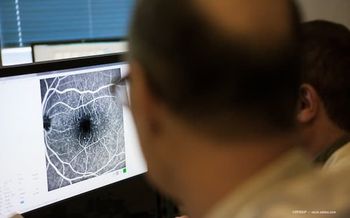
Vision-related quality of life in patients with RVO
RVO can significantly reduce vision-related quality of life, particularly in more severe cases.
The vision-related quality of life can be significantly decreased in patients with retinal vein occlusion (RVO), especially in those with severe disease,1 according to first authors Shahrokh Ramin, MD, and Fatemeh Rostami, MD.
Ramin is from the Department of Optometry, School of Rehabilitation,and the NanoBaran Lab, Incubation Center for Pharmaceutical Technology, and Rostami is from Department of Optometry, School of Rehabilitation, both from the Shahid Beheshti University of Medical Sciences, Tehran, Iran.
The authors undertook a comparative study to assess the vision-related quality of life associated with RVO among patients referred to Labbafinejad Medical Center and Imam Hossein Hospital between 2019 and 2021.
Thirty-seven patients (average age, 61 years) with definitive RVO participated in the study. The study also included 74 age- and sex-matched healthy control subjects. The authors assessed the study participants’ quality of life using the National Eye Institute Visual Functioning Questionnaire-25 (NEI-VFQ-25).
They reported that the quality-of-life scores on the NEI-VFQ-25 were significantly (P < 0.001) lower in the patients with RVO compared with the healthy controls, except in the subscale analysis of ocular pain, color vision, and driving.
The analysis also identified a significant difference when the various RVO subgroups were compared, with patients with central RVO having a significantly (P = 0.01) lower vision-related quality of life.
Finally, the investigators identified significant (P = 0.009) correlations between lower vision-related quality of life and decreased vision (P = 0.009) and longer disease duration (P = 0.011).
The authors concluded, “RVO can significantly reduce vision-related quality of life, particularly in more severe cases.”
Reference
1. Ramin S, Rostami F, Ahmadieh H, et al. Vision-related quality of life in patients with retinal vein occlusion. Int Ophthalmol. 2024;44:114; https://doi.org/10.1007/s10792-024-02916-1
Newsletter
Keep your retina practice on the forefront—subscribe for expert analysis and emerging trends in retinal disease management.



























